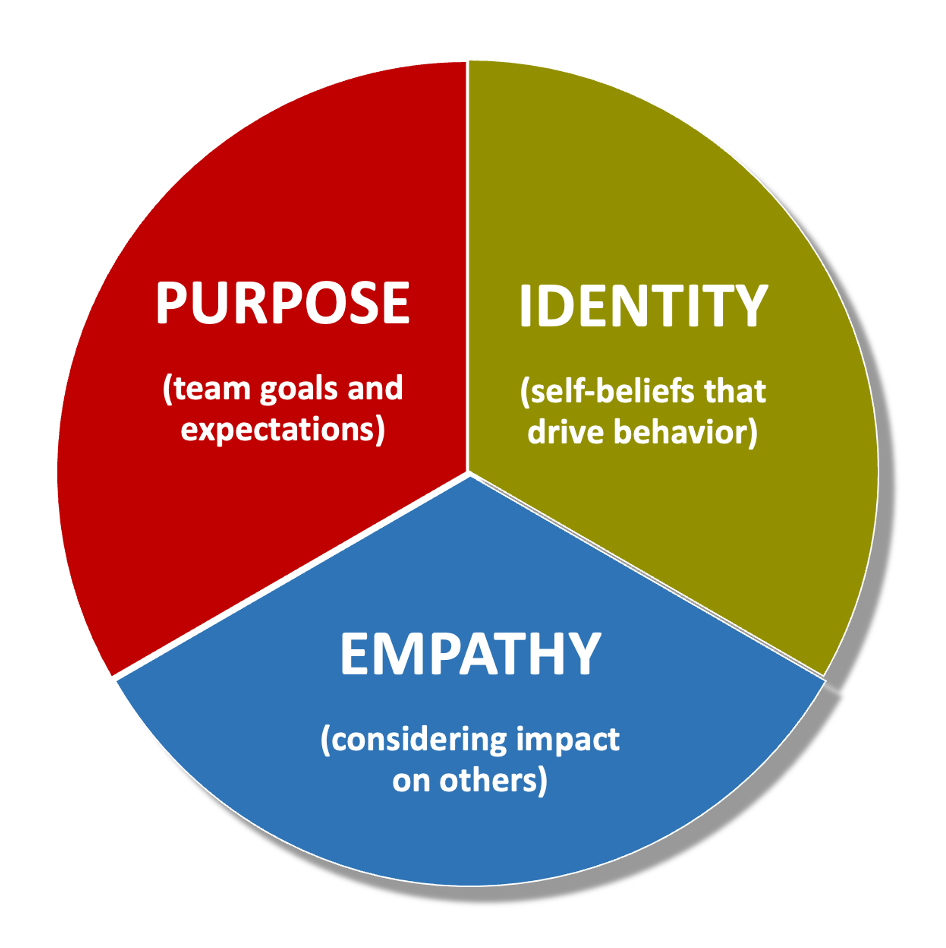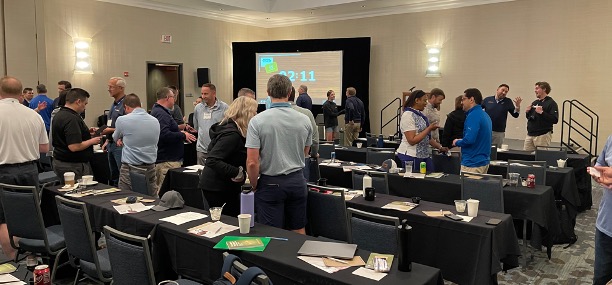As a leader, you and your team become more effective and successful when you and the people you lead are ACCOUNTABLE.
According to Merriam-Webster, accountability is defined as “an obligation or willingness to accept responsibility or to account for one’s actions.”
And for leaders, it has tremendous impact on team performance.
Because accountability affects organizational TRUST, internal communications, and ultimately the results you achieve…

In fact, a Harvard Business Review article shares that “91% of employees feel “holding others accountable” is “one of their company’s top leadership-development needs.”
So when I work with teams and leaders in keynotes or training programs, I share a simpler and more relevant definition – that “being accountable means you DO what you said you would.”
As a young coach, I was like many inexperienced leaders and managers – I was completely wrong in my approach – which largely focused on the belief that it was my job “to hold our players accountable!”
So I did my best –
I provided consequences when our team standards and commitments were not kept.
But no amount of running or consequence ever seemed to REALLY affect THEIR internal decision to BE ACCOUNTABLE.
They complied.
But they seldom transformed to being fully committed because of punishment.
Maybe you’ve found the same to be true on your team, in your business?
Like you, I knew there had to be a better way…
I was tired of being a guard dog.
But leading with fear provides diminishing returns at best.
And creates a toxic culture.
I discovered that accountability is NOT ABOUT CONSEQUENCES.
I knew that our team would be better – and we would all be much happier, if I was instead able to shift to being a more positive and pleasant guide dog.

Sam Silverstein, noted author and speaker on accountability, has said that “It can never be mandated. It can only be inspired.”
So how do you inspire it?
Well, turns out that INSPIRING ACCOUNTABILITY IS AS EASY AS PIE!
There are THREE vital elements required to develop accountability in the members of your team – and across your organization:
PURPOSE (TEAM GOALS AND EXPECTATIONS)
IDENTITY (SELF-BELIEFS THAT DRIVE BEHAVIORS)
EMPATHY (CONSIDERING IMPACT ON OTHERS)

PURPOSE (TEAM GOALS AND EXPECTATIONS)
The first of three things required to inspire accountability on your team is connecting each team member to a compelling common goal –
A clear and motivating purpose is a huge part of improving accountability, because when people feel like the mission they are committed to is meaningful, they do not want to be the person responsible for not achieving that goal.
Engagement, for any employee or volunteer, is determined by how much that person cares about the results their efforts are contributing to…
Helping people see how their efforts matter to a goal they care about accomplishing is a powerful piece of the accountability PIE.
Just as importantly, after connecting the dots between your people and their role and the results you want to achieve together, you will want to make sure that you clarify and get agreement on specific responsibilities.
Setting clear expectations for what they have agreed to do, by when, and to what standard, is a necessary and vital part of team communication and accountability.
IDENTITY (SELF-BELIEFS THAT DRIVE BEHAVIORS)
The second piece of the accountability PIE is helping to shape and strengthen the internal thoughts about identity that your team members are always having.
One of the things I learned as a coach is that our identity drives our behaviors.
As a leader, it turned out that saying “Wow – you really worked hard on that project!” was not as impactful in driving future behavior as when I would say “Wow – you are such a hard worker!”
Noticing an isolated behavior and celebrating it is good.
Helping to solidify the idea to help someone define themselves as a person who always chooses that behavior is powerful.
When you validate the person or teammate as acting out WHO THEY ARE instead of simply commenting on one incident, they are far more likely to continue to consistently display the behavior that they accept as “what someone like them would do.”
Want them to help someone overcome a mistake?
Help them by saying :Huh… that’s not like YOU. You’re somebody that…”
When it comes to inspiring accountability, the people who keep commitments and do whatever is necessary to complete and submit great work are the ones who SEE THEMSELVES as that kind of teammate.

EMPATHY (CONSIDERING IMPACT ON OTHERS)
Empathy is defined by Merriam-Webster as “being aware of, being sensitive to, and vicariously experiencing the feelings, thoughts, and experience of another.”
And empathy is the third part of the equation for getting your team to be far more consistent, dependable, and accountable.
If you have done a good job of connecting your people to a meaningful mission and shared purpose, empathy becomes the final part of inspiring accountability on your team – because empathy is about considering how your behaviors ultimately impact the rest of your team.
That is the value of professionally facilitated business team building events, as the activities and interactions that your people will experience are incredibly effective in creating relationships and increasing an awareness of others.
Because accountability cannot be forced onto your people through consequences or criticism, the decision to focus on helping them create connections among and across the divisions of your organization becomes vital.
None of us wants to let down someone we care about, or to make their day more difficult –
And the EMPATHY that you help strengthen by developing relationships and team collaboration within your organization will have a significant effect on improving accountability.
Those are the three elements you want to emphasize as a leader –
PURPOSE, IDENTIY, and EMPATHY
A shared purpose is the North Star that guides a team toward common goals and objectives. It provides a sense of direction and instills a sense of responsibility to contribute to the larger cause.
Personal identity is about appreciating and valuing the unique qualities and experiences each team member brings – and how those characteristics serve and assist others in their work. A sense of personal identity within a team fosters a culture where members are accountable not just to their tasks but to their colleagues as well.
Empathy is the glue that holds teams together. When team members needs and challenges are understood, they are more likely to take responsibility for their actions and decisions, and become accountable for the well-being of their colleagues.
A team that embodies shared purpose, personal identity, and empathy is a team that thrives on accountability.
These three ingredients not only enhance individual responsibility but also foster a culture where each member willingly accepts ownership for their actions, outcomes, and the well-being of their teammates.
Of course, when commitments are not kept, it is important to have COIN feedback conversations to address and correct that – but organizations that prioritize these three elements that inspire accountability will undoubtedly experience a positive shift in team dynamics, resulting in enhanced performance and greater success.
AND – if you want to grow yourself as a more accountable leader, consider the positive impact that a LEADERSHIP REFLECTION JOURNAL can have on your awareness and growth…
The result of gaining clarity on your purpose, identity, and empathy is not just accountability but a more harmonious and productive workplace!
– – – – –

Sean Glaze is an author and leadership expert who has worked with clients like Cisco, John Deere, Coca-Cola, and Emory University to increase collaboration, boost productivity, and build exceptional workplace cultures.
As a successful basketball coach and educator for over 20 years, Sean gained valuable insights into leading winning teams – and now he travels around the country to share those lessons…
Sean’s engaging conference keynotes and interactive team building events help accelerate the growth of more effective leaders.
And Sean’s books, Rapid Teamwork, The 10 Commandments of Winning Teammates, and Staying Coachable are entertaining parables with powerful take-aways to improve team performance and leadership!

Use Connection Chats to Engineer Better Collaboration Across Every Division on Your Team

Effective Leaders Build Trust and Teamwork by Focusing on Leadership Development

The Power of a Sticky Culture in Boosting Organizational Performance and Retention

Are Your Team Standards Seen as Suggestions or Recognized as Requirements?
Books and Resources for Leaders
Check other blog
Use Connection Chats to Engineer Better Collaboration Across Every Division on Your Team
Effective Leaders Build Trust and Teamwork by Focusing on Leadership Development
The Power of a Sticky Culture in Boosting Organizational Performance and Retention
Contact Sean

Connect with Sean

Tell Sean About
Your Event
Tell Sean About
Your Event
"*" indicates required fields












